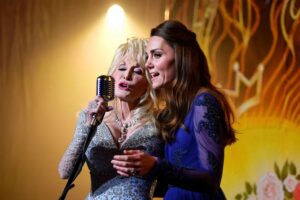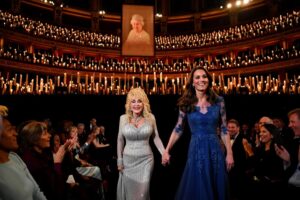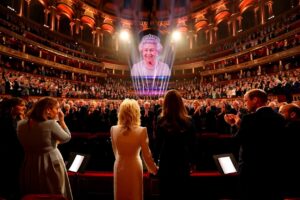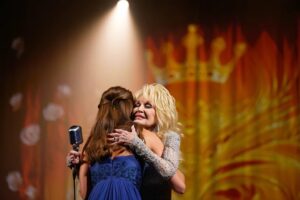Nobody walked into Royal Albert Hall expecting history. And yet, on a candlelit evening meant to honor Queen Elizabeth II, history wasn’t just made—it was sung.
The event, titled “A Queen’s Song: A Royal Tribute to Her Majesty Elizabeth II,” was set to be a tasteful, elegant memorial, with readings, orchestral performances, and quiet reflection. But everything changed the moment two worlds collided in the most breathtaking duet imaginable: Dolly Parton and Catherine, Princess of Wales, singing together for the first—and possibly only—time.

It began with whispers backstage. Dolly was seen in a slate-gray gown, her presence already turning heads. Princess Kate, radiant yet reserved in a deep sapphire dress, had been listed only as a guest speaker. Nobody—not even those seated in the front rows, including Adele and Sir Elton John—knew what was about to happen.
Then, under a single spotlight, the surprise unfolded. Dolly’s unmistakable voice broke the silence, her Southern warmth echoing through the grand hall. Moments later, Kate appeared at her side, and with delicate poise, she began to sing.
The song was new—“Evermore My Queen”—a soul-stirring ballad written exclusively for the occasion. Its lyrics spoke of legacy, of mothers and monarchs, of the quiet courage behind crowns. As Dolly brought her seasoned, emotional fire to each line, Kate countered with a graceful gentleness that stunned even the most cynical listeners. Their voices weren’t just harmonizing—they were holding hands across continents and cultures.

By the second verse, the mood had shifted. Adele was openly crying. Prince William’s expression wavered between awe and heartbreak. For many, this wasn’t just a musical tribute. It was a spiritual reckoning.
But it was the final moment that broke the room.
As the last note hung in the air, Kate reached for Dolly’s hand. The gesture was simple—but it spoke volumes. 4,000 people rose not with thunderous applause, but in a kind of reverent silence, as if something sacred had just occurred. And perhaps it had.

Because in that moment, the boundaries between Nashville and Kensington, between superstardom and royalty, melted away. What remained were two women honoring a queen not just with words, but with heart.

Since that night, social media has exploded. Fans are begging for an official release of the song. Royal commentators are calling it the most emotionally resonant tribute in decades. And insiders whisper that the moment was deeply personal for Kate, who had shared a quiet friendship with the late Queen.

One thing is certain: no one will forget that duet. It wasn’t rehearsed showbiz. It wasn’t tradition. It was raw, real, and rare.
It was music as mourning. It was memory made melody.